Photo: Jamie Crawford Walker

interview
Buju Banton's Untold Stories: The Dancehall Legend Shares Tales Behind 10 Of His Biggest Songs
'Born For Greatness' is the latest entry in Buju Banton’s 30-plus year career. In a wide-ranging interview, Banton reflects on 10 important songs in his ongoing musical odyssey.
When Buju Banton emerged on Jamaica’s dancehall scene in the early 1990s, his ferocious vocals were seemingly incongruous to his youth and slim build, which set him apart from his colleagues. So too did his flurry of early hits: "Bogle," "Batty Rider," "Big It Up," and "Champion." But the precocious teenage sensation also offered serious commentary on such hits as "How Massa God World A Run" and "Deportee."
Thirty years later, Banton continues to defy expectations. His latest album, Born For Greatness, melds reggae and dancehall with elements of R&B, jazz flourishes, crunching rock guitars, even a spirited gospel-tinged closer. "I don’t want anyone to put I in a bubble and say I should only make music like this or like that," Banton tells GRAMMY.com. "Let me be free to create and express the way I feel because I am sure there is someone out there who feels the same way."
Banton has been expressing himself since he was young. Born Mark Myrie, the youngest of 15 children born to a street vendor mother in a poor area of West Kingston, Banton is a descendant of the Maroons, Africans who defeated Jamaica’s British colonizers then retreated to the island’s mountainous interior, where they established communities of free Black people. Buju is a Maroon word for breadfruit and banton refers to a revered storyteller, a name Mark adopted in tribute to the deejay Burro Banton, whom he admired as a child.
Banton began toasting at just 12 years old and, by the early ‘90s, was so popular that the Prime Minister PJ Patterson was among his fans. Patterson missed Banton’s performance at Jamaica’s Reggae Sunsplash 1993 but still desired to see him live. Buju’s close friend/mentor and lovers rock king Beres Hammond granted the Prime Minister’s wish, giving a portion of his set to Buju, then joining him to deliver their hit duet "Who Say." When asked about the Jamaican leader’s request at the time, Buju paused and simply said, "the next prime minister shall know me, too."
Buju released his first album for a major US label, Voice of Jamaica, in August 1993. He followed with 1995’s ‘Til Shiloh, one of reggae/dancehall’s most celebrated and influential releases. Throughout his career, Buju has vacillated between the frenetic dancehall of his youth and the roots reggae associated with the Rastafari way of life that he later adopted.
Buju’s career abruptly stopped on Dec. 10, 2009 when he was arrested at his South Florida home for conspiracy to possess cocaine with intent to distribute. He was briefly released on bail that January and allowed to headline his fundraising concert for his mounting legal costs, which also featured Shaggy, Sean Paul, and Stephen and Damian Marley. A few weeks later, Buju’s Before The Dawn won the GRAMMY Award for Best Reggae Album — though the artist couldn’t attend the ceremony because his trial reconvened the following day. He was found guilty and sentenced to 10 years in a Florida prison.
In December 2018 Buju emerged a free man and returned to Jamaica. Four months later, he headlined his Long Walk to Freedom concert at Kingston’s National Stadium where he drew over 32,000 fans. His first release post-confinement, Upside Down 2020, was also nominated for a GRAMMY Award.
Banton produced the majority of Born For Greatness alongside Jermaine Reid, Stephen Marley and DJ Khaled. On the album’s cover Buju is clad in black leather and adorned with gold jewelry including chunky rings and a thick-linked gold chain wrapped around his head, a provocative image intended to evoke a discussion around mental enslavement.
"The rings are the faces of Frederick Douglas, Harriet Tubman, and the freedom fighters who fought to free us from the chains around our mind because they were adamant in their resolve of freeing the people," Buju explains.
With Born For Greatness the latest entry in Buju’s 30 plus year career, he recently spoke with GRAMMY.com reflecting on 10 songs that span his ongoing musical odyssey.
"Love Mi Browning,"Mr Mention (1991)
Over a bubbling organ riff, Buju declares his love for a Black woman with a light complexion (referred to as a browning in Jamaican parlance). Some listeners perceived the song as Buju expressing a preference for lighter skinned women; the ensuing controversy propelled "Love Mi Browning" to No. 1 in Jamaica and increased the popularity of the captivating, coarse-voiced deejay who recorded it.
"I went to (Kingston’s) Penthouse Records where I met up with (brothers) producers Tony and Dave Kelly, Stumpy the engineer and (singer) Wayne Wonder. We started making music and Dave Kelly wrote "Love Mi Browning" about his then-girlfriend. We started working the song and it just became natural," Banton says.
"We received a lot of backlash, saying we were favoring women of lighter complexion, so I went back in the studio of my own volition and recorded ‘Love Black Woman,’ ("Wi nuh stop cry fi all Black woman/big up all de girls dem wid dark complexion"), which brought balance and silenced the negative energy that was on the surface."
"Deportees (Things Change)," Voice of Jamaica (1993)
Between 1990 and 2005, Jamaica received (proportionately) the largest number of Caribbean nationals deported from the U.S. Canada and the UK. Buju’s huge dancehall hit "Deportees," addresses individuals who had established good lives overseas — perhaps fueled by drug money or other illegal means — with little regard for the well-being of the family members they’d left back home.
His lyrics detail the dramatic changes that occur when these individuals are arrested and convicted: their luxurious lifestyles implode, and they are deported to the land of their birth. "Things change, now unu (you) see say life hard, you never used to send no money come ah yard/You wretch you, you spend the whole ah it abroad, squander your money now you're living like dog."
"I wrote the lyrics and (producer) Dave Kelly made the beat," Buju recalls. "Nowadays, everyone is just frolicking, singing about abstracts; back then, we had to sing about real issues. That was one of the songs that empowered many people, not just in the Caribbean region but throughout the world, to remember where they are coming from, strengthen the Diaspora and make sure they have something at home to fall back on because if you can’t grow where you are transplanted, you have to grow where you are planted."
"Murderer," 'Til Shiloh (1995)
At the height of Buju’s frenetic dancehall success, he dropped a forceful commentary, recorded on the classic 1980s Far East reggae riddim, which had great resonance in the dancehall but also appealed to fans that preferred the more cultural side of Jamaican music. "Murderer", initially released as a single in 1993, decried the island’s escalating violence that claimed the life of one of Buju’s close friends (Anthony "Panhead" Johnson).
"The song was written at a time when the murder rate exploded in Jamaica, everyone had an enemy, and one of our beloved entertainers got caught up in that drama," Buju proffers. "I was on tour in Japan when I got the news that Panhead was killed; I sat in the passageway of the hotel with Frankie Sly and Wayne Wonder and started writing ‘Murderer, blood is on your shoulder/kill I today you cannot kill I tomorrow.’ Jamaica gravitated towards the song’s realness; the sentiment that was expressed was one that we shared because ‘you can hide from man but not your conscience.’"
Thirty years after he wrote and recorded "Murderer" bloodshed in Jamaica, and throughout the world, remains out of control. "If you understand the political system that is in place, all these things are designed," Buju adds. "I try to guide the world with positivity, despite all the negativity in which my name has been typecast."
"Untold Stories," ‘Til Shiloh (1995)
Throughout ‘Til Shiloh — which means until kingdom come — Buju masterfully blends his boisterous dancehall foundation with Rastafarian roots reggae, Nyabinghi drumming and African choral chants, among other influences.
The album’s most surprising track, "Untold Stories," is a stunning, semi-acoustic ballad, with Buju’s visceral, supple sung vocals recounting the struggles of the poor in Jamaica, and all over the world: "I’m living while I’m living to the Father I will pray/only He knows how we get through everyday/will all the hike in the price arm and leg we have to pay while our leaders play." He goes on to instruct the youth to learn from his experiences, "when mama spend her last and send you to class, never you ever play, it’s a competitive world for low budget people, spending a dime while earning a nickel."
Buju was just 22 when he wrote and recorded "Untold Stories," the song’s heartfelt insights and his emotive delivery undoubtedly born of the hardships he and his family endured. "That song was the beginning of a transition in my life where I was exploring my creativity and where the Father wanted me to go in terms of the messages I must carry to the masses," Buju explains. "It was just perfect, a heaven-sent song, I have to say."
"Give I Strength" feat. Ras Shiloh, Inna Heights (1997)
As the title suggests, the superb "Give I Strength" is an invocation for the resilience to get through life’s obstacles, to "live out the greater part of my days." Ras Shiloh’s quivering, soulful tone is an ideal complement to Buju’s granular timbre as they trade verses over an exquisitely crafted reggae rhythm.
"Ras Shiloh was a young emerging talent, American born from Jamaican parents, and I fell in love with his dynamic voice the first time I heard it," Buju shares. "He’s a youth that love Rastafari. [Producer] Donovan Germain invited him to his Penthouse studios one day and he just came up with the perfect renditions to complement what I was saying.
"'Give I Strength' is so relevant in this time, before time and after time, because we all need the strength to be better individuals, so it was natural, pure," Banton says.
"Small Axe" feat. King Stitt, Inna Heights (1997)
One of the earliest practitioners of the Jamaican art of deejaying (also known as toasting), the late Winston Sparkes, a.k.a. King Stitt, was pivotal in elevating the role of a sound system deejay into an attraction in his own right. One of the first deejays to have a hit record (1969’s "Fire Corner,") Stitt rarely recorded after the 1970s, but his inimitable toasting graces the rollicking ska track "Small Axe," featured on Buju’s 1998 GRAMMY-nominated album Inna Heights.
Buju’s first European tour in 1991 circuitously led him to record with Stitt. "I spent six weeks in Europe, I went to Germany, Austria and I knew nothing of making reggae music, I was making dancehall music," Buju reveals. "I came home with the intent to make reggae music. I booked time at Tuff Gong Studios with a group of musicians and said we are going to make live music and they said, ‘are you serious?’ I said ‘yeah, I want to make ska, rocksteady and reggae music.’"
That session netted "Hills and Valleys," "What A Mighty Dread" and"Small Axe." Banton continues, "Making ska was more important than just the instrumental; it provided an opportunity to tap into the richness of our musical culture and to work with a great man like King Stitt. Maybe it was the divine instruction I had to follow as a servant and I did."
"Pull It Up" feat. Beres Hammond, Unchained Spirit (2000)
Despite the very different lanes they occupy in Jamaican music, there’s an undeniable vocal chemistry between Buju Banton and Beres Hammond that has yielded many great singles, including their timeless celebration of the dancehall "Pull It Up." Over an irresistibly danceable reggae rhythm, Beres’s smoky sung descriptions of the dance, "Everywhere I look is pure skankin’, I see no statue around," are punctuated by Buju’s irrepressible, raspy ponderings, "Without di dancehall, a wha we woulda do? When reggae music call, you must answer, too."
Buju detailed their initial encounter: "I first met Beres at a studio in 1992. I was the guy they sent out to buy Guinness, lunch, I was just coming up and I had to pay my dues. One day, I asked Beres, 'Why do you drink so much Guinness?' He said, 'After it passes the heart, that’s when I really start to sing,'" Buju laughingly recalled. "He had a reservoir of knowledge that he was hungry to pass on to a young man like me who was hungry for knowledge where the music is concerned.
"I didn’t get an opportunity to work with him until I proved that I understood the rudiments of music. Then he welcomed me and ever since, we have communicated musically. It’s always a mystical communication with him: he sings, and I am able to feel what he’s singing about and communicate it to the next generation in layman’s terms."
"Driver A," Too Bad (2006)
Set to the sinewy, bass heavy pulse of Sly and Robbie’s Taxi riddim, Buju instructs his driver to "Drop this Arizona [ganja] round Albermarle [a road in Flatbush, Brooklyn]" cautioning him to "remember the damn speed limit because if you run into the feds, that is it."
The clever, detailed lyrics weave an engaging, sometimes humorous narrative and Buju’s gritty delivery is so authentic that "Driver A" was immediately referenced when news broke of his arrest, three years later. Buju says the song was inspired by the hustling he saw going on in America.
"When I come to America and see how the people live, in their day-to-day life, they have to hustle, they have to go hard, everybody has something going on," he says. "Some people can relate, and some can’t relate but it’s a song in ode to those who hustle. It doesn’t get better than that."
"Buried Alive," Upside Down (2020)
Since his release from prison, Buju has said little (directly) in his interviews or through his music about his time in confinement. "Buried Alive" is a powerful depiction of the fortitude required to survive such an ordeal. It’s essentially a rock song with a sputtering tempo, featuring an overlay of searing guitars that accompany Buju’s anguished vocals: "Buried alive but I’m still breathing, I don’t know what tomorrow may bring but I got a feeling/I am alive, there must be a reason, I was given one more chance, my heart is still beating," sings Buju.
"They planted a seed, and I was allowed to grow. And grow I did," Buju said regarding the song’s subject matter. "My captors expected me to be bitter, but I said, 'Father forgive them because they know not what they did.' My mission still continues, I have not done anything different than what I was doing before, which was making music and loving people."
When asked if he wrote songs during his imprisonment, Buju says. "I did what I had to do to stay alive, it was that simple. Whether it was writing songs, teaching, being a source of light in a place of darkness, I was doing what I had to because the Lord ordained that I had to be there."
"Let My People Go," Born For Greatness (2023)
Buju concludes his latest album with a rousing gospel-influenced cry for personal liberation and the freedom of his people. The title is taken from a refrain that echoes throughout "Go Down Moses," a centuries-old African American spiritual, originally written about the exodus of the ancient Jewish people from slavery in Egypt. "Let My People Go" is shouted in a call and response fashion throughout Buju’s song, written about present day atrocities: "The whole world is in bondage (let my people go), tell these tyrants to let go (let my people go) what remains they may not be able to salvage (let my people go), they shall be riot, and rooting, and raving, and ravaged (let my people go)."
"The message is needed now more than ever," Buju states. "Freedom is being eradicated every day and people are being herded. The whole world is in bondage and the only hope is the truth, so we remove the veil from our eyes so we can see everything and everyone for who they are. The truth shall make you free. We are tired of this perpetual struggle, we are tired of this physical existence, just let my people go."
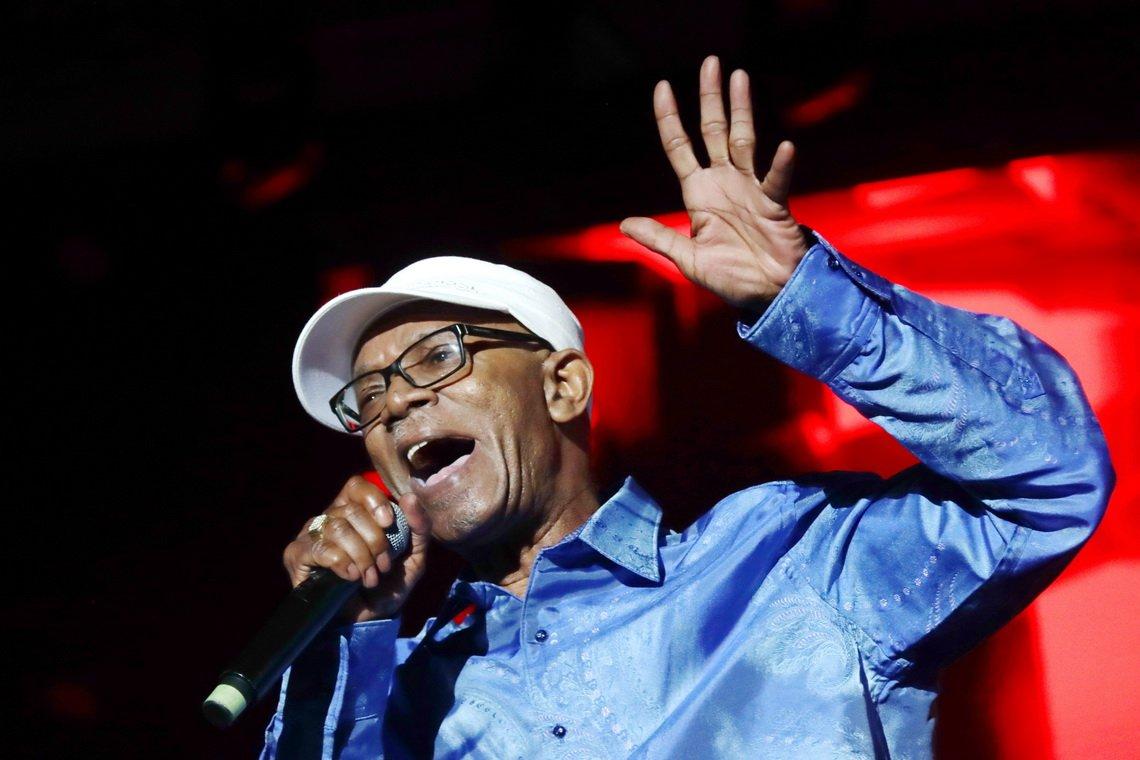
Photo: Steve James
interview
Living Legends: Beres Hammond On His Enduring Career, Timeless Music & 'Brand, Jamaica!'
Beres Hammond has had a lengthy career in reggae, both as a member of Zap Pow and as a solo artist. The two-time GRAMMY nominee discussed his enduring popularity and what he hopes younger artists can learn from his story.
Prior to performing his first song at Reggae Sumfest 2024, Jamaica’s largest music festival, legendary vocalist Beres Hammond shared a concise but important message. "Jamaica," he bellowed, seemingly as a greeting, which he followed by shouting "brand." "We are a brand! I am, you are. Brand! Say it," he instructed. "Brand, Jamaica!"
Throughout his July 20 Sumfest set, Beres interspersed the catchphrase "brand, Jamaica," as if reminding the audience of 15,000 (and the younger artists backstage) at Montego Bay’s Catherine Hall, of Jamaican music’s significant legacy and widespread impact. Countless musical gems comprise brand Jamaica, but few, if any, are more precious than the songs of Beres Hammond.
Born Hugh Beresford Hammond in the small fishing village of Annotto Bay, the two-time GRAMMY nominee first gained notoriety in the early 1970s fronting reggae/R&B fusion outfit Zap Pow. As a solo artist, Beres’ songs primarily explore the erratic complexities of romantic relationships; his charismatic, powerfully granular vocals have been likened to that of soul legends Otis Redding, Teddy Pendergrass and Sam Cooke.
"I never thought I’d reach this point," Hammond tells GRAMMY.com. "Even now, I still show respect to the folks that helped me to grow and are helping me to still be relevant."
At Sumfest, accompanied by his superb Harmony House band and three flawless female backup singers, Beres delved into his beloved catalog, as the audience, spanning three generations of fans, loudly sang along. After performing his first No. 1 single, the 1976 soul nugget "One Step Ahead," which held the top spot in Jamaica for over three months, Beres reminisced onstage, "People thought I was an American guy. It was my first taste of success, but I had no money, I couldn’t even ride the bus. I was broke!"
Beres released a spate of popular singles beginning in the late 1970s into the mid-1980s yet he continued to struggle financially. His situation improved with his initial release on his own Harmony House label, the 1985 hit "Groovy Little Thing."
A sequence of hits followed recorded for various Jamaican producers including 1987’s "What One Dance Can Do," which spawned several answer records (including Hammond's own "She Loves Me Now"). His 1990 defiant social critique, "Putting Up Resistance", produced by Tappa Zukie, remains one of the biggest reggae songs from that era.
Working with producer Donovan Germain’s Penthouse Records, in 1990 Beres laid his vocals over a riddim called "A Love I Can Feel" (after singer John Holt’s 1970 hit, itself a Temptations cover). The resultant "Tempted to Touch" topped reggae charts internationally and commenced a stream of Penthouse hits for Beres that also included "A Little More Time" and "Who Say," collaborations with a gruff-voiced teenaged sensation, Buju Banton.
As his fan base expanded throughout the Caribbean and reggae Diaspora, alongside increasing acclaim for his stellar songwriting and passionate, pliant vocals, it was inevitable Beres would attract major label interest. He signed to Elektra Records, for whom he released just one album, the outstanding In Control, in 1994, featuring the sublime, sultry R&B flavored single "No Disturb Sign."
Between 1996 and 2018 Beres released seven self-produced studio albums through his Harmony House label’s joint venture with Queens, NY based VP Records, including two GRAMMY nominated titles in the Best Reggae Album category. Beres received the nod for his 2001 album, Music is Life at the 44th GRAMMY Awards and again at the 56th GRAMMY Awards for his 2012 album One Love, One Life.
Beres has collaborated with dancehall superstars Sean Paul and Popcaan, and his work has been referenced by Jamaican artists including singer/songwriter Tanya Stephens and sing-jay Mavado. Although he hasn't had a U.S. mainstream hit, Hammond's music is nonetheless recognized by some of the industry’s biggest names. In 2012 Rihanna tweeted the lyrics to Beres’ "They Gonna Talk," obliquely addressing her then rekindled relationship with Chris Brown; at an event in Barbados, she was seen singing along to a medley of Beres hits. Drake conveyed his fondness for the iconic vocalist by retweeting a fan’s declaration that she’d like Beres Hammond to sing at her wedding. Wyclef Jean conclusively expressed the veneration due the bespectacled songster on the outro to his 2001 duet with Hammond "Dance 4 Me," bluntly stating, "All you fake singers, bow down to the legend."
Beres Hammond's most recent single "Let Me Help You" was released on May 3; VP Records says a new Beres project is possibly due by the end of 2024. In between rehearsals for a spate of performances in the New York tri-state area, Beres Hammond sat down with GRAMMY.com and discussed his enduring popularity, his messages to younger artists and the meaning of "brand, Jamaica."
Welcome back to New York City. I was at Reggae Sumfest and I saw your wonderful performance. There’s something extra special about your performances in Jamaica, seeing, hearing different generations of fans singing along to your songs.
What I like most is when the young folks, teens and 20s say, "My mom used to listen to you when she’s in the kitchen working, that’s how I know these songs." They still love them, still sing them. It makes me feel like I came out here to do a job and everything’s been accomplished.
Why do you think your music has such vast appeal among various age groups?
I think it’s the way I present my songs. I make it so easy for everyone to have access. I don’t use Wall Street words; I make it A-B-C. I just do my thing in the simplest manner so everybody can sing it!
You just performed two sold out shows at the Coney Island Amphitheater and the New Jersey Performing Arts Center part of your Forever Giving Thanks tour. So many decades after you started out, that must feel extremely gratifying.
Everyday feels like a new day on the job. I’m giving thanks that I’m in good health and I’ve still got some voice left. All the folks around me, like the band and crew, they’re treating me as if we just started. When you have people around you like that, it’s almost like the journey has just begun.
Have you been working with the same band members for all these years?
For a lifetime, almost. Some have been with me for over 30 years. For the newest members, it might be 10 years.
Throughout your Sumfest performance you intermittently shouted, "brand, Jamaica!" What does that mean?
I was talking about me, what a beautiful brand, but also Jamaica, itself, to the world. Helluva brand! I join the folks that still have Jamaica on the world map as a brand to be reckoned with. Because we nah go nowhere. We deh yah! [We’re here].
I’ve always thought of myself as a brand and upcoming artists should recognize the legacy that’s left here for them. I say "brand" again, to make them understand the role they’re supposed to be playing in what was handed down to them. Be proud of what you’ve got because you are standing on some broad shoulders; be careful how you step on those shoulders.
Coming up in the 1970s and early '80s, whose shoulders did you stand on?
What introduced me to wanting to sing was a few voices including Otis Redding, Sam Cooke, Stevie Wonder, he’s still amazing. I used to love Aretha Franklin and I still love Patti LaBelle. I listened to those voices and said, "Yeah, I would love to sing like them." Then checking on my Jamaican folk, Alton Ellis, Delroy Wilson, hearing those voices, I thought, there must be something out there for me.
Learn more: Remembering Coxsone Dodd: 10 Essential Productions From The Architect Of Jamaican Music
Are there any artists you are mentoring, artists that are standing on your shoulders?
Some of them come up to me and say Father B — they call me all kinda names, Father B, Dada, and they give me some nice accolades. I don’t seek them out, they find me and I always have the right things to say to them, if they ask. Kids still want to learn and being around me, you will learn many things.
Thirty years ago, in 1994, you released your album 'In Control' for Elektra Records. It's still one of my favorite albums.
At that time Elektra went into some merger. The beautiful Elektra crew working with me — some got fired, some went to other places; it was a mess, man. That had a great effect on what the album should have done and really turned me off from Elektra and major labels. This is how people with their big bag of money treat people, come in, push us around. But through the years, I’ve learned that [Elektra] took my music to places that I don’t think I would have reached, so it helped me along.
You continue to have a very successful career, but I can’t help but wonder, had 'In Control' received the push it should have, would your music be better known beyond a reggae audience?
I don’t know, but I know where I stand now and where we are still aiming to go. That never came out of our focus because, hey, the sky’s the limit.
Where are you aiming to go, what are some of the things that you’d still like to do?
I’d like to sing that song that makes the whole world sing along. I’m not sure if I’ve made that one yet.
I hope that my Jamaican brothers and sisters who are making music take it seriously and remember, you’re an influence. Ask yourself, what kind of influence do you want to be to the next generation? Do you want to be the one to make them have a better education? Do you want to be the one that makes them aspire to be leaders? Or do you want to be the one to send them to prison?
Is there any place that you haven’t yet performed but would like to?
People have asked me, what’s my favorite place to perform? I still don’t know. My favorite place is anywhere in the world; once you gather to see me, oh God, that’s my favorite place.
How has the music industry changed in the years that you’ve been in it?
You have to brace to face any new challenge in music. But all I’ve ever wished for is, no matter what kind of changes the music goes through, keep the thing positive so the people can learn. I can’t tell the younger generation what to do. I had my time and did what I had to do; you have to allow them to be themselves, too. Whatever changes the new generation wants to make, I’m there with them; just keep those values and you’re good.
On Jan. 1, 2023, you and Buju Banton put on a very successful concert in Jamaica called Intimate. Any chance you’ll bring that back?
They just talked to me yesterday about it. [Hammond imitates Buju’s resounding voice] "What ‘appen? What are we saying? Second leg? Father B, give I the green light." So, we are looking forward to bringing that back in January 2025.
Read more: Buju Banton's Untold Stories: The Dancehall Legend Shares Tales Behind 10 Of His Biggest Songs
You’ve recorded many songs with Buju and in 2023 you released another collaborative single "We Need Your Love"; an album was expected to follow. Are there any release plans for the Beres/Buju album?
We’ve already recorded 12-15 songs so when them ready, they will tell me. I did songs for Buju and he did songs for me.
Earlier, you mentioned turning on the radio to hear a song that everyone will sing along to; do you listen to Jamaica’s radio stations to hear the latest music?
I listen to talk shows to tap into what the country is doing. You have people calling in, talking about what the prime minister is doing, how many people died today. Music is around me through my kids, my friends. I’m up on everything; without actually listening to it, I’m hearing it.
You have six children; some are pursuing music careers. Tell me about them.
One of them, DJ Inferno, he’s always on the road with me; he plays before I perform, and he mashes up the place all the while. My son Rasheed is in production, trying to establish his own label, he’s ready to start releasing music. One of my daughters, Nastassja, they call her Wizard, she’s a writer, artist, producer. My other daughter, Andrene, is an actress (Andrene Ward-Hammond stars on the CW Network’s "61st Street") and she’s on tour with me looking after my personal needs.
Sometimes I am out here with all six of my children. It’s a beautiful thing. They make me proud.
More Reggae News
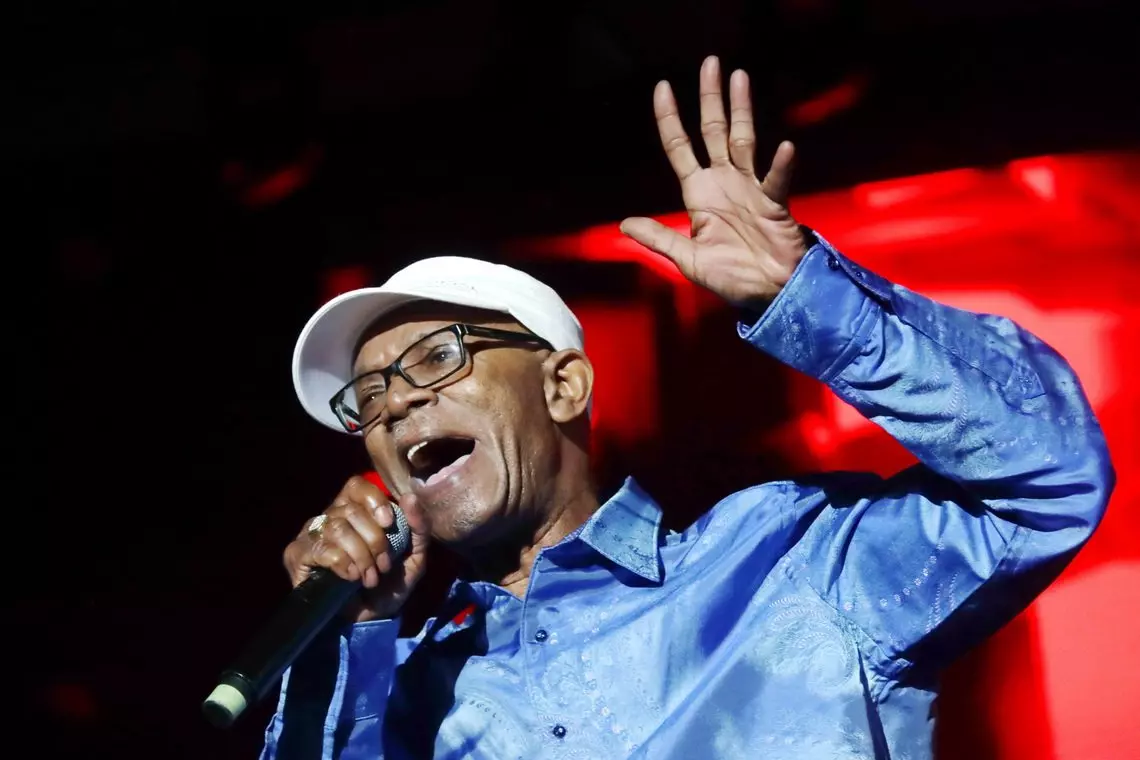
Living Legends: Beres Hammond On His Enduring Career, Timeless Music & 'Brand, Jamaica!'
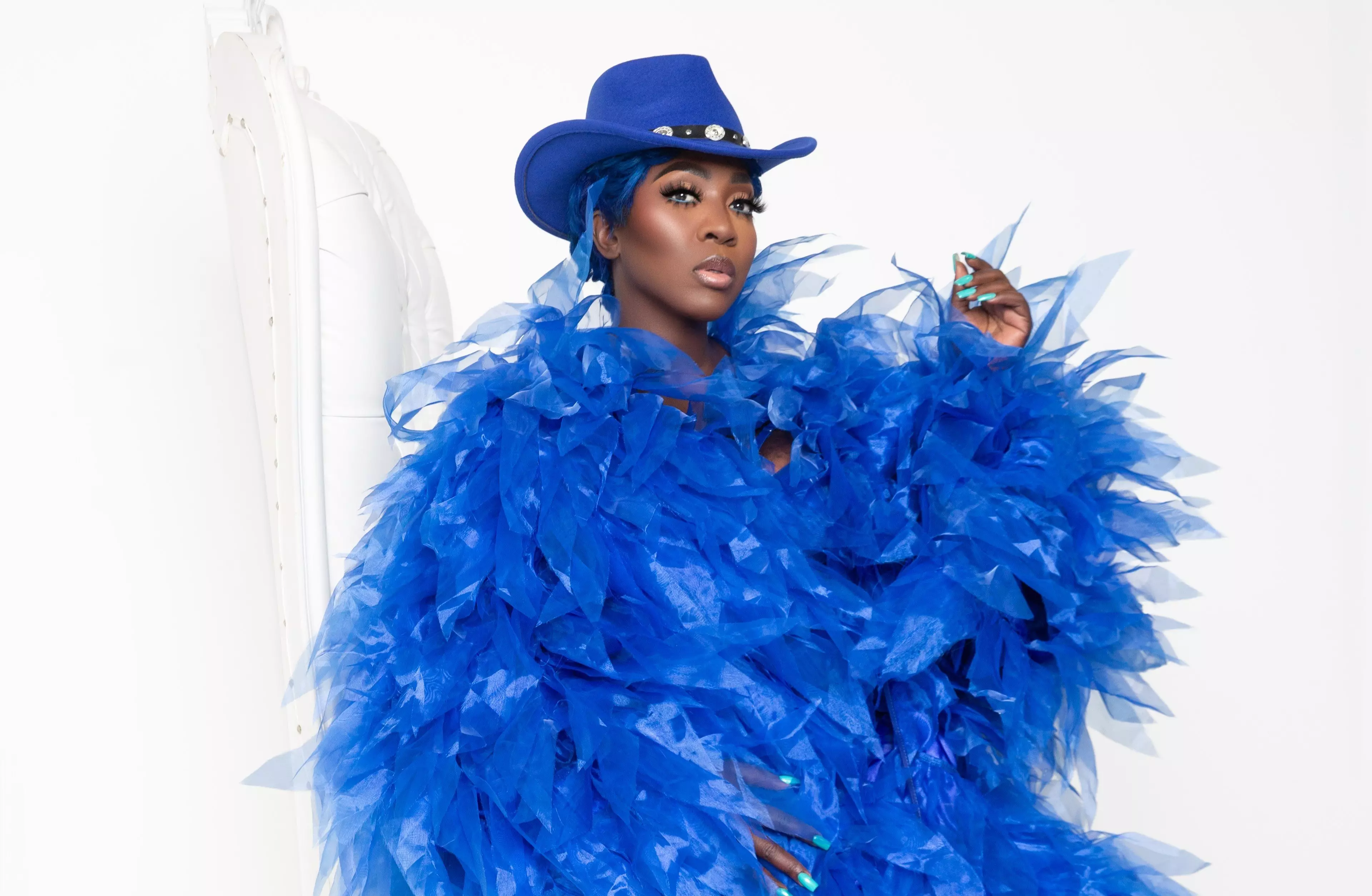
Dancehall Legend Spice Reflects On 'Mirror 25,' Her Near-Death Experience & Owning Her Own Vision
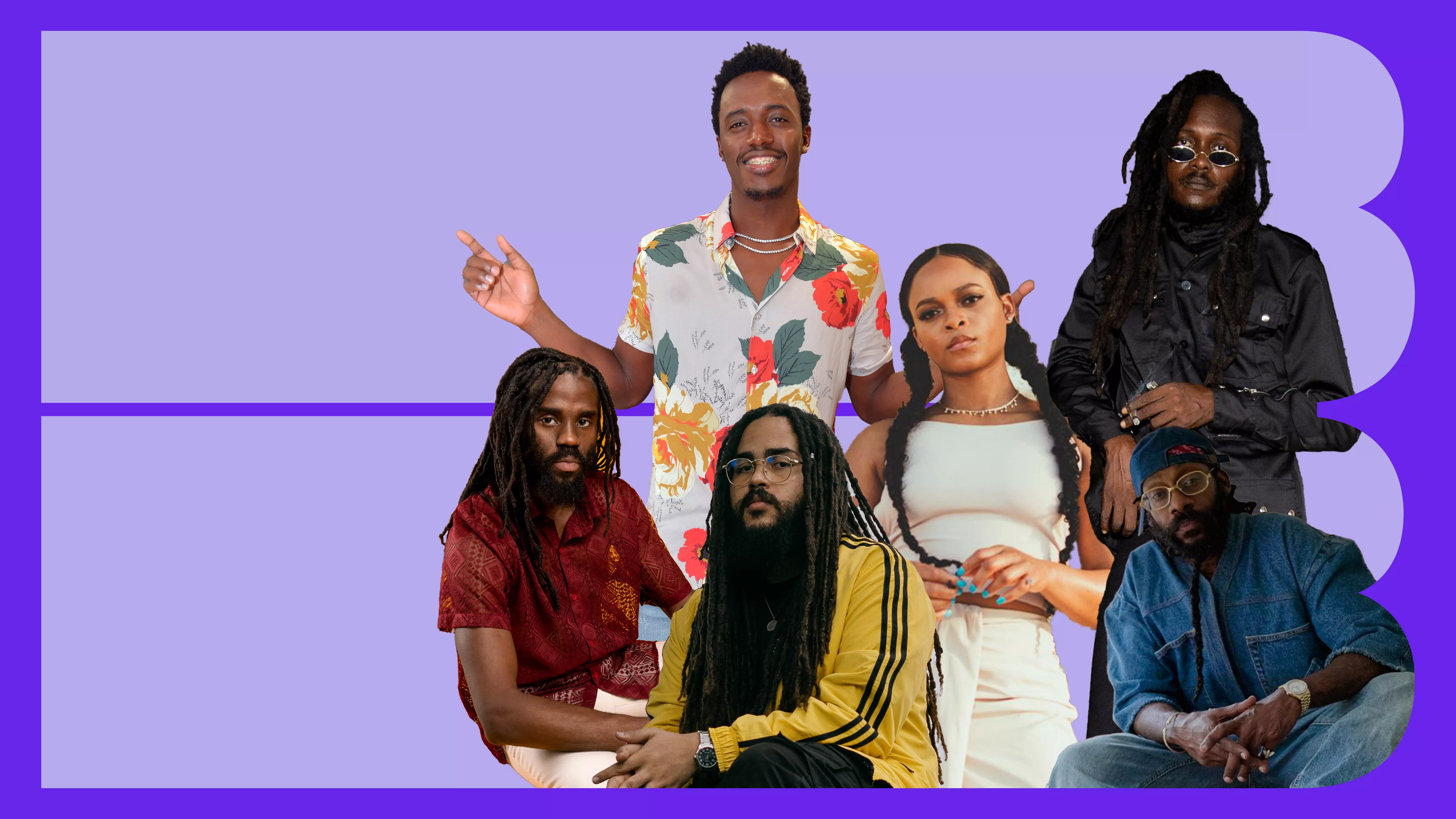
10 Artists Shaping Contemporary Reggae: Samory I, Lila Iké, Iotosh & Others
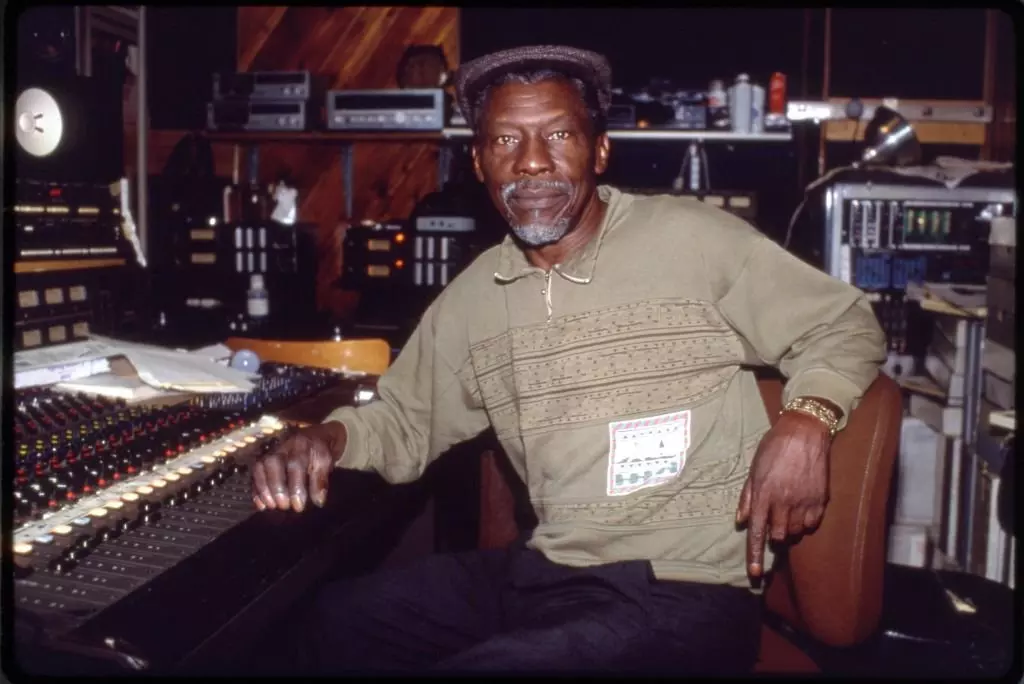
Remembering Coxsone Dodd: 10 Essential Productions From The Architect Of Jamaican Music
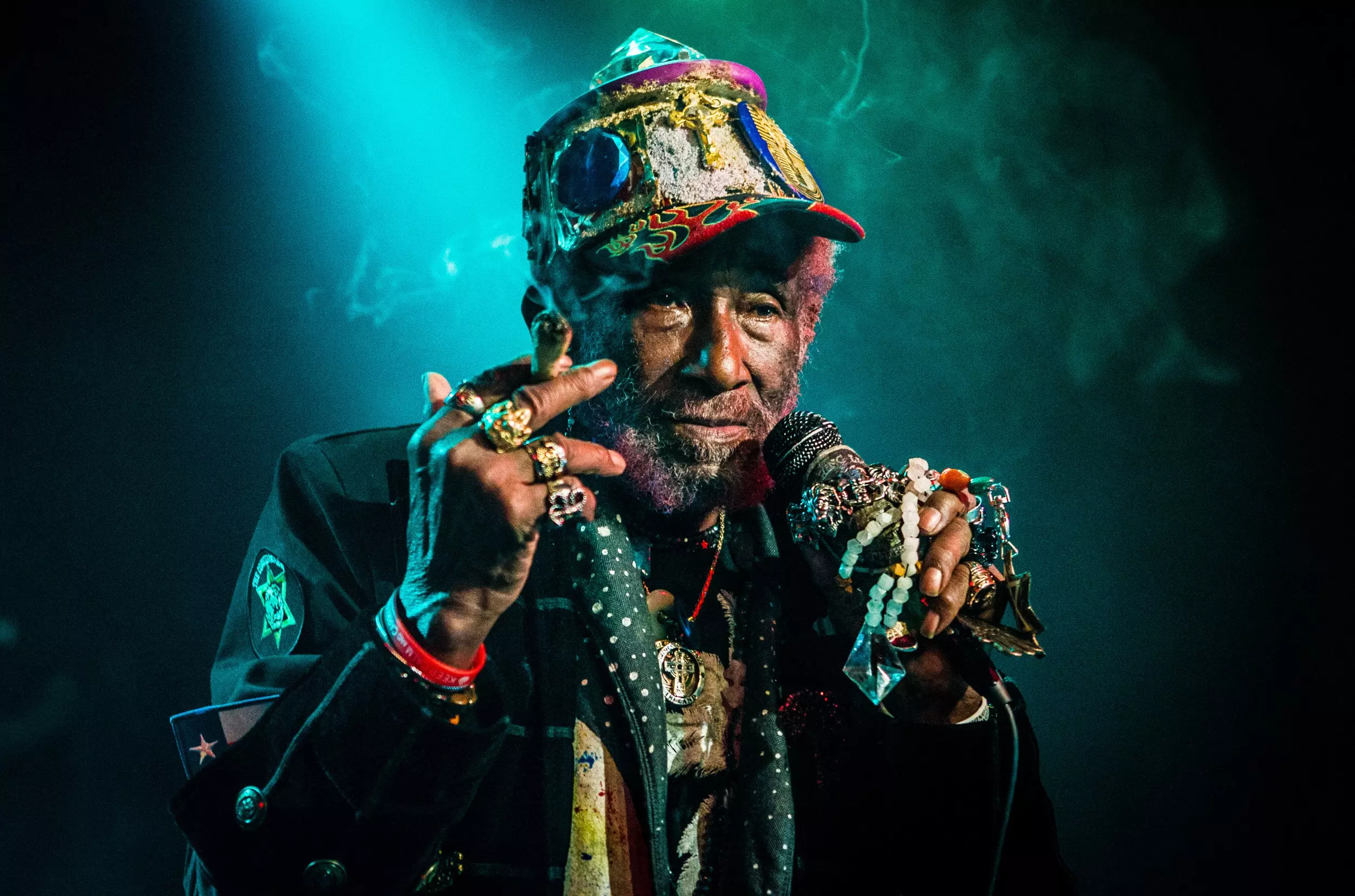
Lee "Scratch" Perry Documentary Director Sets The Record Straight On The Reggae Icon's Legacy — Including A Big Misconception About Bob Marley
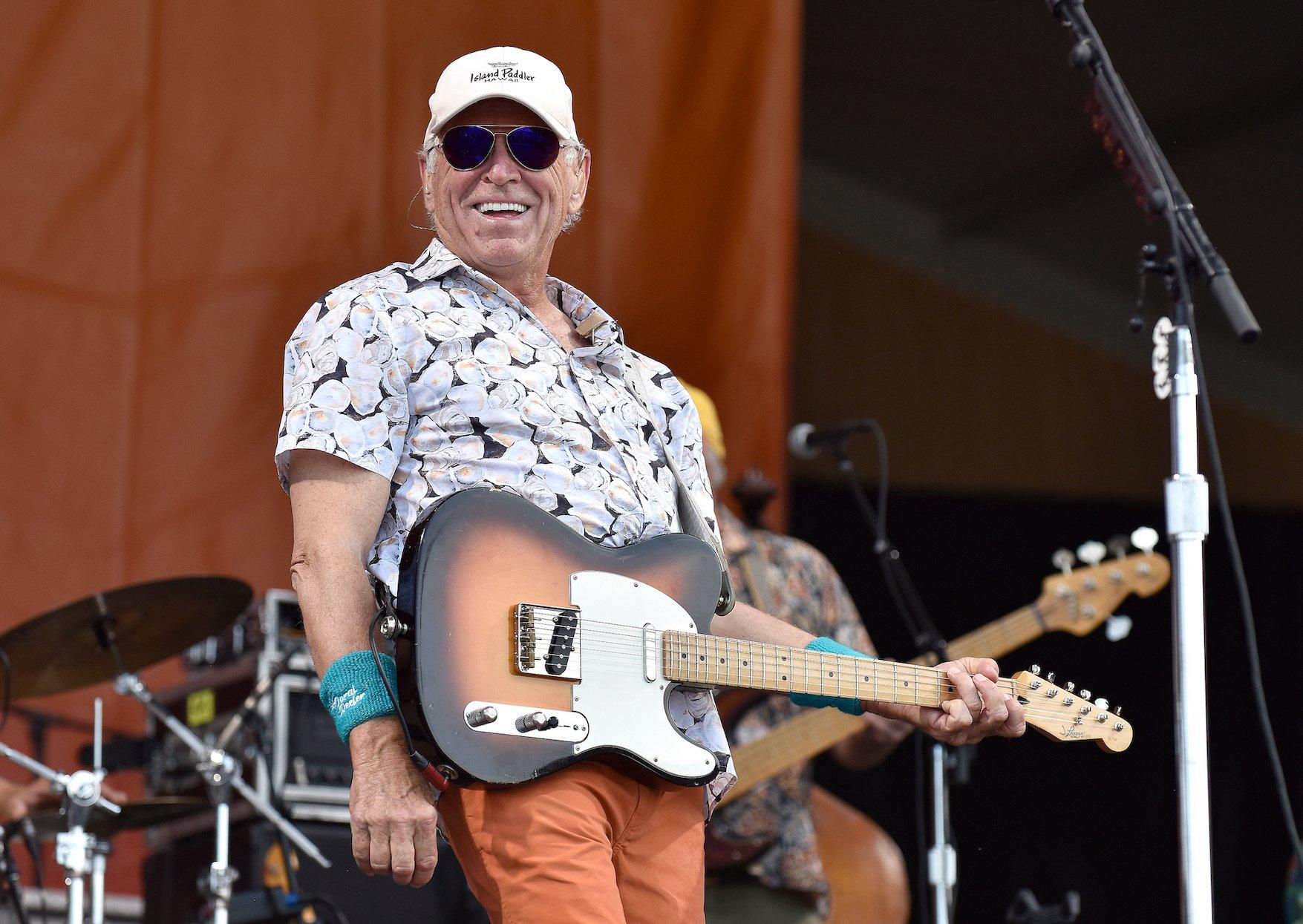
Photo: Tim Mosenfelder/WireImage
list
A Pirate Looks At Infinity: Jimmy Buffett's Legacy In 15 Songs
A year after his untimely passing, look back at the songs that point most convincingly back to Jimmy Buffett — the man, the artist and now, the never forgotten legend.
When Jimmy Buffett passed away on Sept. 1, 2023 at age 76, the decorated singer/songwriter, performer, author and entrepreneur left behind a legacy that unified a swath of musical genres and people.
The man behind "Margaritaville" — the song and later the brand — and so many other tunes that bridged folk sensibilities with country and rock touches, sometimes called "Gulf & Western," was much more than the beach-obsessed character he played in song. Although he had plenty of industry successes, notching 13 Billboard Hot 100 hits, a pair of GRAMMY Award nominations, while selling more than 20 million albums, his fans loved him for how he made them feel.
In song, he was a true storyteller that was clever, funny and introspective; in performances, he was the quintessential Parrothead to the core. As the ringleader of the party, he was generous enough to share the spotlight with members of his Coral Reefer Band as well as the fans who dressed up, tailgated outside the venues and spread their joy to others.
Both sides of Buffett were crucial building blocks in the business empire he built around his persona as the laid-back, casually philosophical beach bum. The Margaritaville restaurant and resort chains, his Landshark Lager beer and many other ventures made him a billionaire, while his storytelling prowess made him one of few authors to top both fiction and nonfiction bestsellers' lists. While his legacy may be both musical and merchandisable, the endearing qualities of the Parrothead personality he created is the real reward for his fans.
Below, remember Buffett's illustrious career through 15 classic songs — just a glimpse of his genius that made it okay for country singers to loosen up, for rockers to pick up an acoustic guitar, and for the Parrotheads to while away their days in the sun.
"Why Don't We Get Drunk," 'A White Sports Coat and a Pink Crustacean' (1973)
While Buffett's first two albums showed glimpses of the celebrated artist he would become, his songwriting largely hewed close to the earnest observations typical of early-seventies folkies. By his third album, though, he had grown into his winking style of satire and breezy, Nashville-meets-Key West flair.
This cut from A White Sports Coat and a Pink Crustacean combined both, and created the template for hundreds of bleary-eyed sing-alongs to follow. "The Great Filling Station Hold-Up" may have been the proper album single, but "Why Don't We Get Drunk," its controversial B-side, became the bigger tune — and the one featured on his seven-times Platinum compilation, Songs You Know By Heart.
"Come Monday," 'Living & Dying in ¾ Time' (1974)
As Buffett pulled away from his folk sensibilities, Nashville-style balladry became a big part of his sound. "Come Monday" brings orchestral strings into the mix to help express the yearnings he felt while stuck in "a brown L.A. haze," pining for his love back home. The song resonated with new fans, becoming his first Top 40 single, as it peaked at No. 30 on the Billboard Hot 100.
"A Pirate Looks at Forty," 'A1A' (1974)
It probably wasn't a stretch for Buffett to sing so convincingly from the perspective of a seafaring, modern-day pirate. He considered his own later entrepreneurial forays an adventure on the high seas of life. But back in '74, he was so inspired by the real-life stories of a Key West smuggler and rapscallion he befriended that he wrote "A Pirate Looks at Forty" from his perspective.
A key cut on his second long-player of '74, A1A, "Pirate" is empathetic to the dashed dreams and yearnings of a man looking back at his wins and losses. And despite the eventual billionaire fortunes of Buffett himself, his narrator determines the balance is a draw.
"Margaritaville," 'Changes in Latitude, Changes in Attitude' (1977)
Buffett's next album, Changes in Latitude, Changes in Attitude, launched his music career into the stratosphere — and its success had a lot to do with "Margaritaville," a Top 10 hit and the basis of the global brand he later built.
Essentially, "Margaritaville" established the beach-boho lifestyle as an aspiration for millions. Against a backdrop of tropical instruments like steel drum and marimba, Buffett sang of the quiet pleasures of an unhurried life, unconcerned with the tides and buoyed by his favorite blender drink. In 2016, the tune was voted into the GRAMMY Hall of Fame, while the Library of Congress added it to the National Recording Registry in April 2023.
"Son Of A Son Of A Sailor," 'Son Of A Son Of A Sailor' (1978)
Whether Buffett's soft and breezy music can be considered "yacht rock" is a subject of debate, but he certainly rocked a yacht or two in his day — and he dressed the part for the cover of his album Son Of A Son Of A Sailor. The title track is a definitive take on his love of the wandering life, untethered from the anchors many cling to and always in search of the next port of call. A master of ballads whimsical and wistful, Buffett manages to be both at once here.
"Cheeseburger in Paradise," 'Son Of A Son Of A Sailor' (1978)
Before it was a menu item at his Margaritaville-branded restaurants and resorts, "Cheeseburger in Paradise" was a mirage Buffett dreamed about while marooned at sea. As the story goes, a misadventure in the Caribbean left Buffett with only meager rations to survive. And when he finally struck a landing on dry ground, his first meal inspired one of his most enduring songs: an easy-rockin' Top 40 hit about cheeseburgers that somehow isn't a novelty cut — a hat trick only Buffett could pull off.
"Fins," 'Volcano' (1979)
As the lead tune from his 11th album, Volcano, "Fins" entered the pantheon of Buffett concert staples immediately and helped inspire plenty of Parrothead ephemera, as well as the title of the 1990 live album Feeding Frenzy and his Landshark Lager brand. But none of that would be important if not for Buffett's song about a hapless woman who travels to the beach to relax, but instead is encircled by "sharks that can swim on the land." With "fins" to the left and right of her, she's "the only bait in town."
"Boat Drinks," 'Volcano' (1979)
Buffett had a knack for coining phrases — and "Boat Drinks" certainly qualifies among the best. What makes a boat ride better? Boat drinks, of course.
An album cut from Volcano (also featured as a B-side to the single "Survive"), Buffett ironically wrote the song while on a winter sojourn in Boston, exiled from his native habitat and wishing the city's fresh blanket of snow were the sugar-white sands of Florida. Musically, the tune is a quintessential cut from his whirlwind late-seventies period, when Caribbean themes and sonic textures became his calling card.
"It's My Job," 'Coconut Telegraph' (1981)
Long before Mac McAnally joined Buffett as a sideman in the Coral Reefer Band, Buffett sent the young artist a note praising his songwriting. Then, for his 1981 album, Coconut Telegraph, Buffett boosted his new friend's fortunes by recording "It's My Job," a tune McAnally wrote about taking pride in your work — however menial or miserable it may be — while working on a hot Mississippi highway in the summertime. The tune reached No. 57 on the Billboard Hot 100, marking Buffett's last appearance on the chart until 2003 (more on that later).
"One Particular Harbor," 'One Particular Harbor' (1983)
The 1980s were the beginning of Buffett's transition from chart champion to blockbuster concert draw. But he still had plenty of gas in the songwriting tank, as songs like "One Particular Harbor" proved.
Inspired by his travels in Polynesia, Buffett sings in Tahitian about the "abundance of the sea" after leaving behind the mainland. While the song was a minor hit on Adult Contemporary radio, it became a fan favorite and a mainstay of live shows from the era.
"Jamaica Mistaica," 'Banana Wind' (1996)
Like on "Cheeseburger in Paradise," Buffett's penchant for seeing the humor in the unfortunate dustups of his real life shines on the Banana Wind cut "Jamaica Mistaica." In this case, Jamaican police opened fire on his plane, believing he was a smuggler or criminal straight out of his own song "A Pirate Looks at Forty." Set to a reggae beat, though, Buffett lets listeners in on the joke — an endearing quality that earned him the love not only of Parrotheads, but also an official apology from the Jamaican government.
"It's Five O'Clock Somewhere," Alan Jackson's 'Greatest Hits Volume II' (2003)
By the dawn of the new century, Buffett's beach-bum aesthetic had conquered Nashville, the town he left in the early '70s to find his identity as an artist in Key West. And "It's Five O'Clock Somewhere," recorded with country star Alan Jackson and featured on his Greatest Hits Volume II, was exactly the new Buffett-style anthem Music City needed.
It was also what Buffett's 21st century career needed: "It's Five O'Clock Somewhere" earned the veteran singer his first No. 1 on Billboard's Hot Country Songs chart as well as his first GRAMMY nomination (in the Best Country Collaboration With Vocals Category) and his first Country Music Association Award (for Vocal Event of the Year). Later, the song notched the No. 3 song of the decade on Billboard's Hot Country Songs chart, proving Buffett's staying power amid shifting musical trends.
"Bama Breeze," 'Take the Weather With You' (2006)
After Hurricane Katrina made matchsticks of Buffett's home territory in 2005 — the beachfront bars of Mississippi, Alabama and Florida where he cut his teeth — he responded with the album Take the Weather With You and its leadoff track, "Bama Breeze." The country-rock tune extols the virtues of the so-called "Redneck Riviera" and coming of age as the sun came up outside the dive bars of the Gulf Coast, many of which were now ruined. The song also nods to the fans who have stuck by him since the beginning: "At the Bama Breeze, you're one of our own down there/ You'll never drink alone down there/ Good god, I feel at home down there."
"Knee Deep," 'You Get What You Give' (Zac Brown Band, 2010)
One of the most rewarding markers of a mature career in music is the respect paid by each successive generation of musicians. Newly minted country star Zac Brown paid homage with "Knee Deep," which was written with Buffett in mind and borrows heavily from his long-established beachbound, escape-by-tropics aesthetic. But it truly takes off when Buffett himself takes the second verse and then harmonizes the choruses with Brown. And the combination proved sweet for both acts: the song was certified triple Platinum and landed at No. 1 on Billboard's Hot Country Songs and Country Airplay charts.
"Bubbles Up," 'Equal Strain On All Parts' (2023)
Although the public wasn't aware at the time, Buffett was dealing with the effects of Merkel cell carcinoma — the disease that claimed his life — throughout his final years of touring and recording music. Released two months after he passed, Equal Strain On All Parts, his 32nd and final album, arrived like a comforting voice from beyond to Parrotheads and casual fans alike.
On "Bubbles Up," Buffett was in a particularly reflective mood, facing his own mortality in his most measured, reassuring manner. The title phrase came from his survival training — if he were to find himself submerged in water, either from a boat or plane wreck, his trainers advised him to follow the bubbles up to the surface. "They will always point you toward home," he sings, "no matter how deep or how far you roam."
For a songwriter and performer who spent his life showing the world how to relax, enjoy life and see the humor in life's challenges, the reassuring sentiment — to quote the title of his 2004 album — underscores that a License to Chill has no expiration date.
Latest News & Exclusive Videos

Watch Ray Charles Win Album Of The Year In 2005
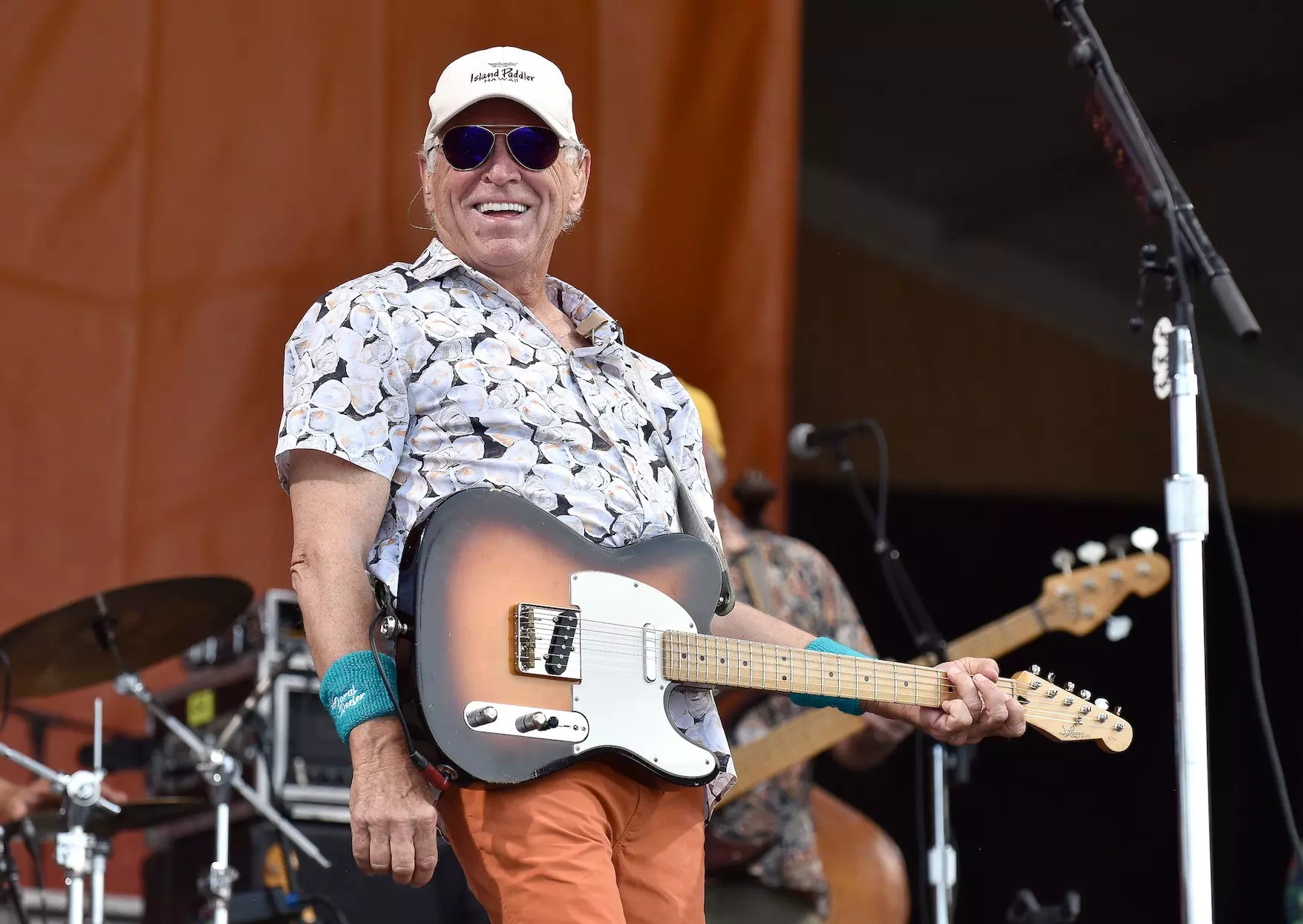
A Pirate Looks At Infinity: Jimmy Buffett's Legacy In 15 Songs
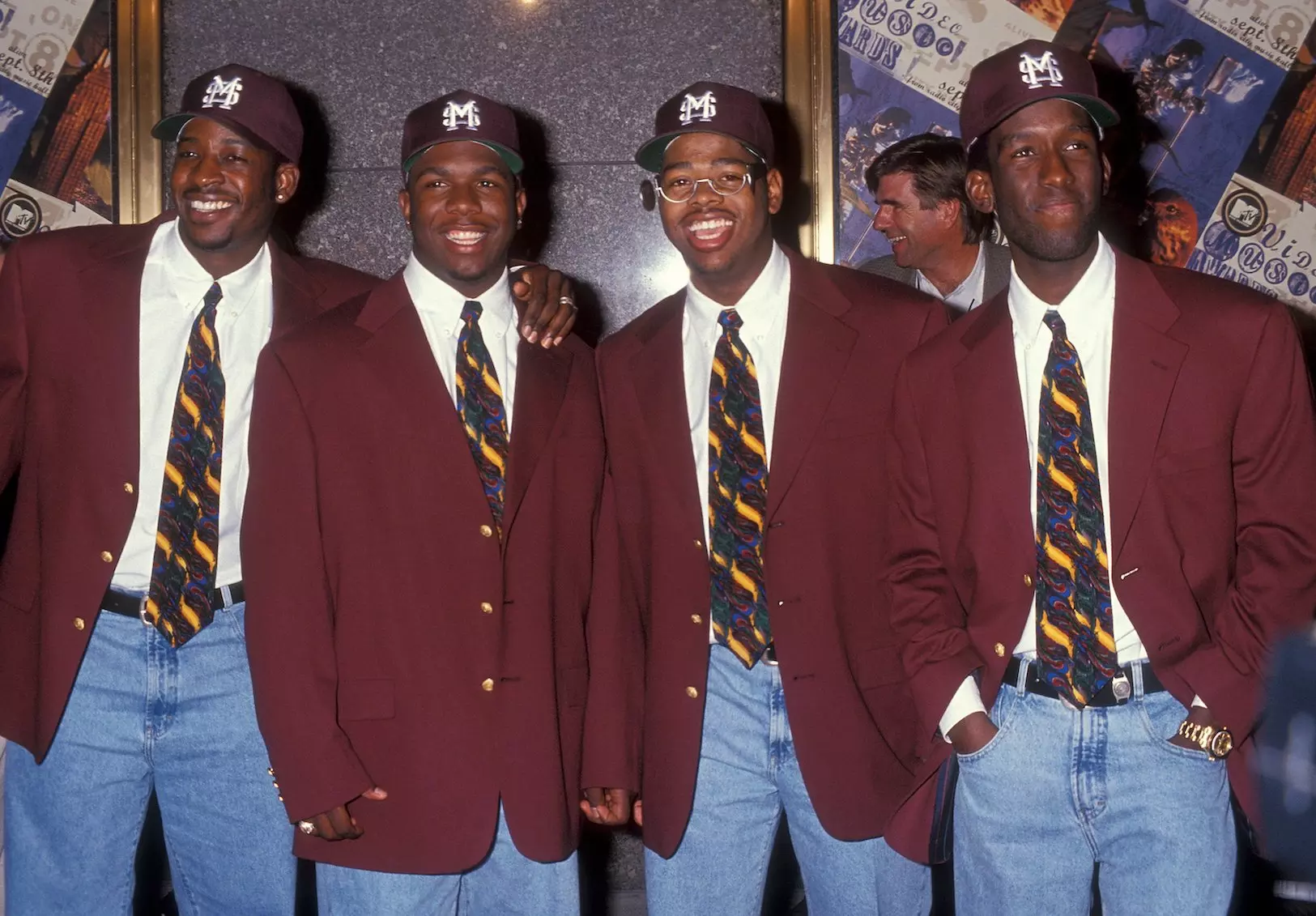
8 Reasons Why Boyz II Men's 'II' Was The '90s Ultimate R&B Blockbuster
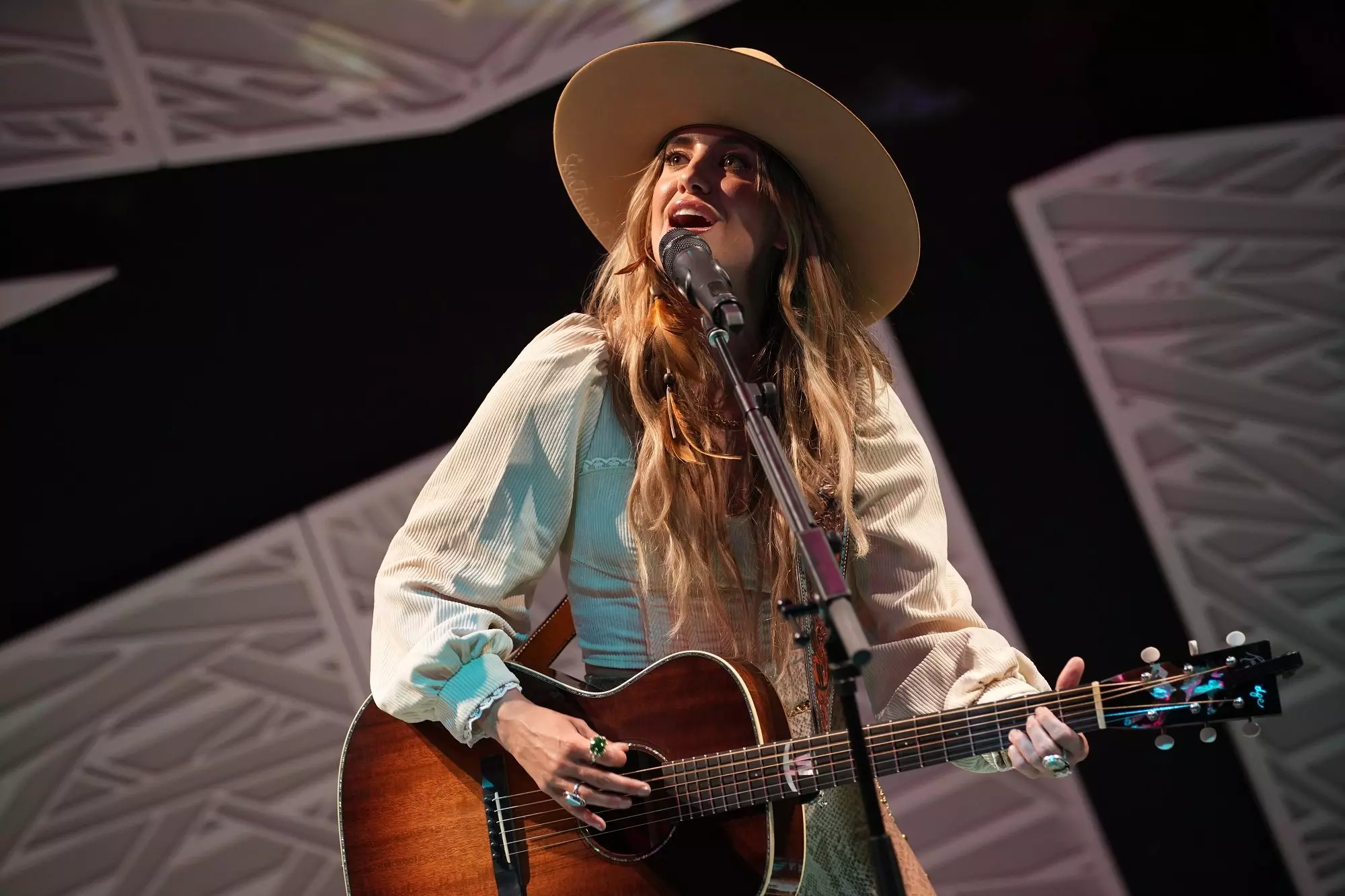
20 Live Events At The GRAMMY Museum This September: Experience Orville Peck, Kate Hudson, Tierra Whack & More

Watch Wunderhorse Perform "July"
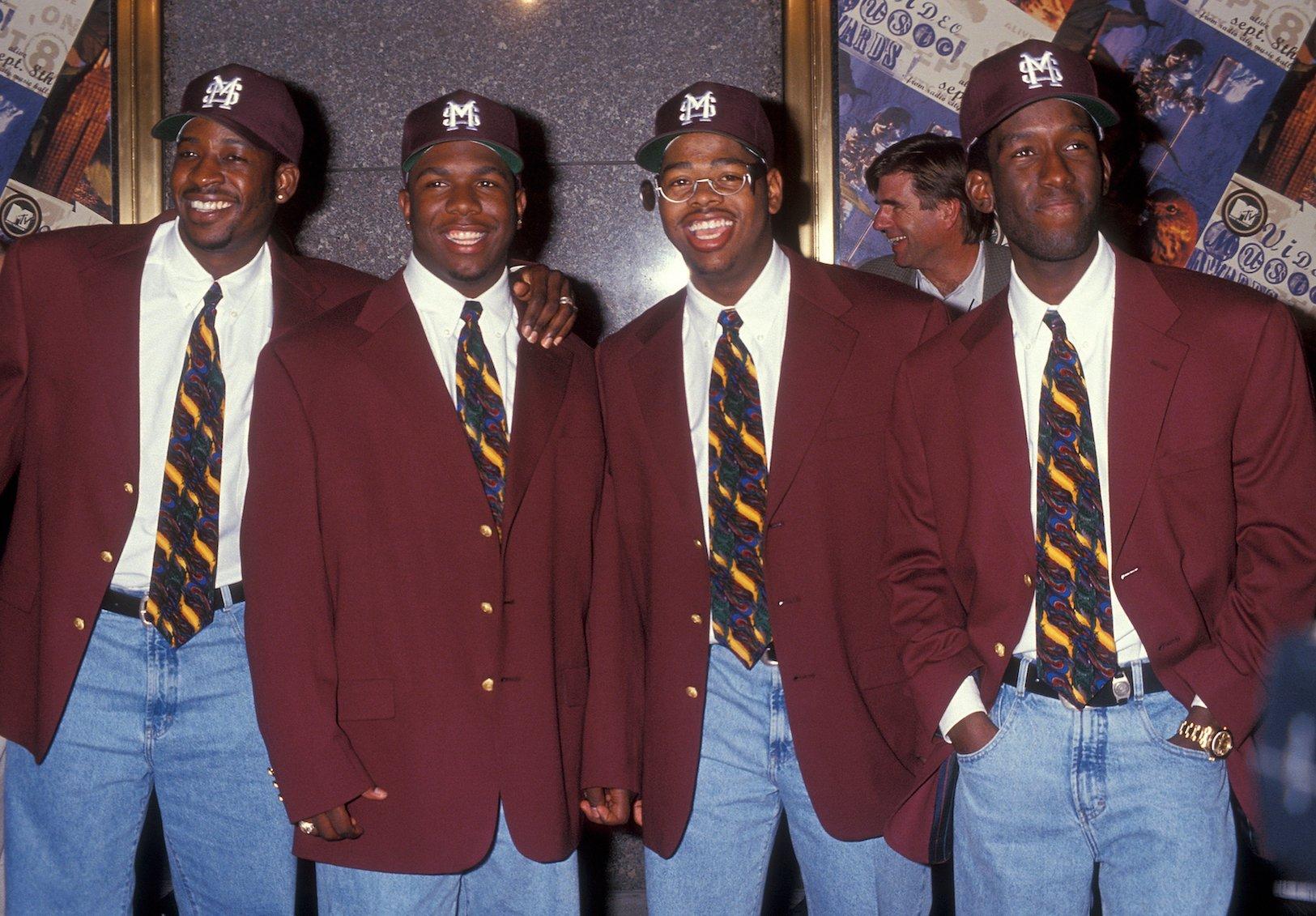
Photo: Ron Galella, Ltd./Ron Galella Collection via Getty Images
list
8 Reasons Why Boyz II Men's 'II' Was The '90s Ultimate R&B Blockbuster
From historic GRAMMY wins to star-studded music videos, Boyz II Men achieved unthinkable feats with their second album. As the LP turns 30, dig into why 'II' remains one of R&B's all-time greats.
After releasing a debut album that went nine-times platinum, spawned a record-equaling 13-week chart-topper, and pioneered a new subgenre (remember hip-hop doo-wop?), Boyz II Men could have been forgiven for resting on their laurels for LP number two. Instead, they made a concerted attempt to go even bigger and better.
Indeed, celebrating its 30th anniversary on Aug. 30, the simplistically titled II was precision-tooled into becoming the ultimate R&B heavyweight of the '90s. "I personally came up with the name because I wanted people to know that this is a continuation of the first record, like a sequel to a movie or something like that," singer Shawn Stockman later revealed to Billboard in 2019.
Bandmate Nathan Morris was just as laser-focused on maintaining a stranglehold on the top of the charts, continually perusing sales figures across the world to work out how they could corner certain markets. Their seminal record label, Motown, meanwhile, even used market research to ensure that fans got what they wanted to hear, resulting in a collection of slick soulful ballads which utilized the vocal quartet's impressive harmonies like never before.
Such meticulousness paid off when II ended up surpassing its predecessor in sales, chart records, and general critical acclaim. And Wanya Morris believes it's more than worthy, recently telling Billboard, "If you want an example of what music is, we want the definition in an encyclopedia or on the internet or in any dictionary to be the II album."
In honor of II's 30th anniversary, here's a look at how the trio (and former memberMichael McCary, of course), lived up to all their blockbuster talk.
It Achieved Three Remarkable Chart Feats
Boyz II Men were such a chart juggernaut in the mid-'90s that they joined an exclusive club populated only by the Beatles! Indeed, the quartet became only the second ever act to replace themselves at the top of the Billboard Hot 100 when "On Bended Knee" dethroned "I'll Make Love To You" in September 1994. This was the first such instance since the Fab Four's "Can't Buy Me Love" toppled "She Loves You" 30 years previously (in the years since, 12 more acts including Taylor Swift and Drake have also achieved the feat).
This wasn't the only time the Philadelphians essentially became their own rivals, either. Their 14-week run atop the Hot 100 of "I'll Make Love To You" surpassed the 13-week stint enjoyed by "End of the Road" two years earlier. As a result, the group not only set the record for longest Hot 100 reign at the time, but they also became the first artist to achieve two consecutive No. 1s with double-figure spells.
It Made GRAMMY History
Boyz II Men looked like they'd soon run out of space in their trophy cabinet when they won the Best R&B Performance by a Duo or Group with Vocal GRAMMY for the third time in four years. The vocal troupe first picked up the coveted gong in 1992 for Cooleyhighharmony, and then 12 months later for its lead single "End of the Road." And while their winning streak was interrupted by Sade's "No Ordinary Love" in 1994, they soon reclaimed the trophy in 1995 thanks to "I'll Make Love To You."
The four-piece also made GRAMMY history that same ceremony when they became the inaugural victors of the Best R&B Album Category. II triumphed overAnita Baker's Rhythm of Love,Tevin Campbell's I'm Ready,Gladys Knight's Just for You,Me'Shell NdegéOcello's Plantation Lulllabies, andLuther Vandross' Songs. But despite a further eight GRAMMY nods, this remains their last victory.
It Boasts The Avengers Of '90s R&B Producers
Boyz II Men initially planned to give Tim Kelley and Bob Robinson — the Illinois duo who'd later helm Top 10 smashes for Jon B, Sisqo and Tamia — the creative reins for II. But concerned the relative unknowns might not have the experience, Motown insisted on bringing in the big guns, too.
Tim and Bob did contribute to five tracks, including fifth single "Vibin'" and the tribute to late manager Roderick Rountree, "Khalil (Interlude)." But it was the more recognizable names that provided the monster hits, whether Janet Jackson cohorts Jimmy Jam and Terry Lewis on "On Bended Knee," one-man hit factory Dallas Austin on "Thank You," or the four-time Producer Of The Year, Non-Classical GRAMMY winner Babyface on "I'll Make Love To You."
There was even room for mogulL.A. Reid ("I Sit Away"), Cooleyhighharmony contributors the Characters ("Jezzebel"), and croonerBrian McKnight (bonus track "Fallin'") to make their mark on a record whose credits read like a who's who of '90s R&B.
It Spawned A String Of Star-Studded Videos
It wasn't just behind the scenes where Boyz II Men assembled a wealth of talent. The group also bagged a whole host of stars from both the small and big screen to give their music videos that extra bit of pizazz.
In "I'll Make Love to You," White Men Can't Jump actor Duane Martin plays the security installation engineer who essentially becomes amorous pen pals with his latest customer. Saved by the Bell's Lark Voorhies, Living Single's Kim Fields, and daytime soap opera stalwarts Victoria Rowell and Renée Jones all break up and then make up with their respective Boyz in "On Bended Knee." And the supermodel holding the band inside a crystal ball in "Water Runs Dry"? Well, that's none other than Tyra Banks.
The latter promo, which Morris once told GRAMMY.com was a personal favorite, also picked up Best Cinematography and Best R&B Video nods at the MTV VMAs.
Read More: Boyz II Men Celebrate 25 Years Of Their Masterstroke Second Album, 'II'
It Was Also A Sales Behemoth
II instantly became Boyz II Men's second No. 1 on the Billboard 200, and by Christmas of 1994, the album was posting weekly sales of nearly 300,000 copies. Little wonder, therefore, that it became the third biggest seller of 1994 (behind The Lion King soundtrack and Ace of Base's The Sign). In fact, it even ended up in the Top 10 best-sellers of the following year, too.
By the end of its campaign, II had been awarded diamond status, making it one of the biggest selling R&B albums of all time. (Depending on how you categorizeMichael Jackson's Thriller and Bad andWhitney Houston's two eponymous LPs, it could even lay claim to being the biggest.) Its lead single, "I'll Make Love To You," also racked up impressive numbers, selling over 1.6 million copies during and after its lengthy residency at the top of the Hot 100.
It Spawned Two Spinoffs
Boyz II Men were so determined to conquer the world with II that they even re-recorded several tracks in a completely different language. Yes, in an effort to reel in the Latin market, the vocal quartet gave their Beatles cover, "On Bended Knee" ("Me Rindo Ante Ti"), "I'll Make Love to You" ("Yo Te Voy A Amar") and "Water Runs Dry" ("No Dejemos Que Muera El Amor") the Spanish treatment for a bilingual special edition released a year after the original. The latter track even made No. 1 on Billboard's Latin Top 10 airplay chart.
Keen to strike while the iron was hot, Motown also issued a compilation featuring remixes of tracks from their first two albums, including a version of "Vibin'" featuring Busta Rhymes and Method Man. The Remix Collection, however, reportedly didn't receive the blessing of the band themselves, and their relationship with the iconic label was never the same again.
It Paved The Way For The Modern Boy Band Ballad
While predecessor Cooleyhighharmony contained its fair share of air-grabbing, silky smooth, close harmony ballads (see "End of the Road"), it was II where Boyz II Men truly mastered the art. Alongside its first two singles, "50 Candles," "Fallin'" and "Trying Times" all crooned and swooned about love in a manner that had certain fans ready and willing to throw their undergarments on stage in appreciation.
And the new generation of boy bands who valued vocal ability as much as pin-up appeal were undoubtedly taking note. Listen to Backstreet Boys ("I'll Never Break Your Heart," "Show Me the Meaning of Being Lonely"), NSYNC ("Drive Myself Crazy," "This I Promise You"), and 98 Degrees ("(I Do) Cherish You," "My Everything") in full-on serenade mode, and it's clear that II set the template.
Luckily, the group responsible were happy to pass the mantle on. As Stockman toldABC News at the peak of TRL, "As far as we're concerned, this is their era and this is their time."
It's Stood The Test Of Time
The 2021 Netflix original series This Is Pop argued that Boyz II Men's impact on pop culture has been unfairly overlooked since their imperial phase came to an end. Yet, numerous artists — many of whom were still in diapers when they were regularly topping the charts — have borrowed from their sophomore set in recent years.
In 2018, for example, Drake sampled "Khalil (Interlude)" on Scorpion cut "March 14," while Swedish house maestro DJ Seinfeld's "With My Love" lifts vocal snatches from "Water Runs Dry." The latter has also been treated to full reinterpretations from singer/songwriter Jens Lekman in 2008 and cover version extraordinaire Kelly Clarkson in 2021. Meanwhile, Justin Bieber — who recruited the group for his festive 2011 album, Under the Mistletoe — put his spin on "I'll Make Love to You" during a 2015 gig at the W Hollywood Hotel.
And with its first two singles racking up 277 million and 163 million Spotify plays, respectively, II appears to be connecting, and reconnecting, in the streaming age, too.
Latest News & Exclusive Videos

Watch Ray Charles Win Album Of The Year In 2005

A Pirate Looks At Infinity: Jimmy Buffett's Legacy In 15 Songs

8 Reasons Why Boyz II Men's 'II' Was The '90s Ultimate R&B Blockbuster

20 Live Events At The GRAMMY Museum This September: Experience Orville Peck, Kate Hudson, Tierra Whack & More

Watch Wunderhorse Perform "July"
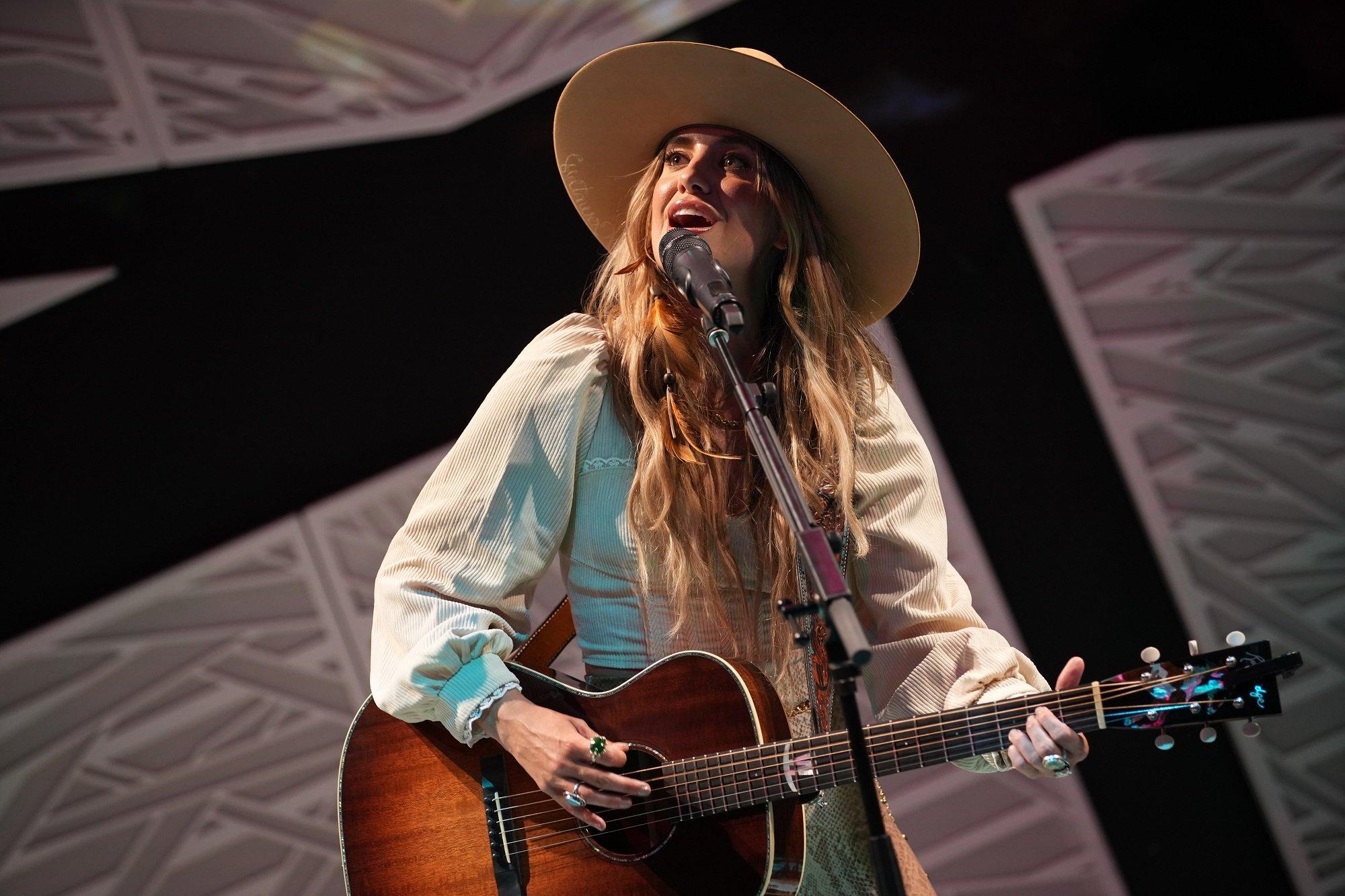
Photo: Rob Kim/Getty Images for The Recording Academy
news
20 Live Events At The GRAMMY Museum This September: Experience Orville Peck, Kate Hudson, Tierra Whack & More
This September, join the GRAMMY Museum for live discussions and performances from Lainey Wilson, Sleater-Kinney, Don Toliver, and many more.
As the leaves begin to turn and the evenings draw in, the GRAMMY Museum is preparing to host an exciting lineup of in-person events this September in downtown Los Angeles and New York City.
Featuring a diverse array of artists from Big Sean to Steve Aoki, the Museum offers fans unparalleled access to intimate discussions and performances. Whether you're a fan of indie vibes, soulful melodies, or the pulsating rhythms of global pop, there's something for everyone in this season's programming.
Check out the comprehensive list of must-attend GRAMMY Museum public programs for September 2024:
A Conversation With Big Sean
August 30, 2024 at 6 p.m.
L.A.
Sold Out - Join Waitlist
While not actually in September, Big Sean kicks off the fall season in a big way. The legendary rapper joins guests at the Museum’s intimate 200-seat Clive Davis Theater for an evening of conversation discussing his latest album, Better Me Than You, his creative process, and more.
Spotlight: Faye Webster
Tuesday, September 3, 2024 at 7:30 p.m.
L.A.
Sold Out - Join Waitlist
Join Atlanta-based singer-songwriter Faye Webster as she discusses her latest album and creative journey in an intimate setting.
Global Spin Live: I.M
Wednesday, September 4, 2024 at 7:30 p.m.
L.A.
Sold Out - Join Waitlist
Dive into the world of K-pop with I.M, the lead rapper of Monsta X, as he discusses his solo career trajectory and upcoming music, capped off with a live performance.
The Drop: Lainey Wilson
September 5, 2024 at 7:30 p.m.
L.A.
Sold Out - Join Waitlist
Join country music great Lainey Wilson at the Museum’s 300-seat Ray Charles Rooftop Terrace for an evening of conversation celebrating her career, latest project, WHIRLWIND, and more, with a performance to follow.
A New York Evening With Ingrid Michaelson
September 5, 2024 at 7:30 p.m.
N.Y.C.
The GRAMMY Museum and 92NY are thrilled to host Ingrid Michaelson for an intimate conversation about her album, For the Dreamers, composing music for The Notebook, her creative process, and more, followed by a performance.
A New York Evening with Tierra Whack
September 6, 2024 at 7:30 p.m.
N.Y.C.
Join Tierra Whack at National Sawdust in Brooklyn, NY to celebrate her debut project, Whack World, with a discussion about her creative process behind the release, her career, and more, with a special performance to follow.
An Evening With Kate Hudson
Monday, September 9, 2024 at 7:30 p.m.
L.A.
Sold Out - Join Waitlist
Actress and singer Kate Hudson will share insights into her musical expression showcased in her latest album Glorious, followed by a performance.
Read more: Kate Hudson Is A Singer Now — And She Doesn't Care What You Think
An Evening With Sleater-Kinney
(Moderated by Molly Neuman)
Tuesday, September 10, 2024 at 7:30 p.m.
L.A.
Sold Out - Join Waitlist
Celebrate 30 years of Sleater-Kinney as they discuss their enduring influence, latest music, and personal trials, accompanied by a live performance.
Read more: On 'Little Rope,' Sleater-Kinney Still Wear Their Hearts On Their Sleeves
A New York Evening with Chris and Rich Robinson of The Black Crowes
September 11, 2024 at 7:30 p.m.
N.Y.C.
Sold Out - Join Waitlist
Join Chris and Rich Robinson of The Black Crowes at National Sawdust in Brooklyn, NY to celebrate their 10th studio album, Happiness Bastards, with a discussion about their careers, their creative process behind the project, and more, and a special performance to follow.
A Conversation With Don Toliver
(moderated by Charlie Wilson)
September 11, 2024 at 7:30 p.m.
L.A.
Join Don Toliver and Sickamore to the Museum’s intimate 200-seat Clive Davis Theater for an evening of discussion about Don Toliver’s album, HARDSTONE PSYCHO, their collaboration, careers, and creative process. The conversation will be moderated by R&B Icon and 13 time GRAMMY Nominee Charlie Wilson.
A New York Evening With Hermanos Gutiérrez
September 12, 2024 at 7:30 p.m.
N.Y.C.
Join Hermanos Gutiérrez at National Sawdust in Brooklyn, NY celebrating their latest album, Sonido Cósmico, with a discussion moderated by WNYC’s John Schaefer about their creative process, career, and more, with a special performance to follow.
Spotlight: John Summit
(Moderated by Jason Bentley, KCRW / Metropolis)
September 12, 2024 at 7:30 p.m.
L.A.
Join John Summit at the Museum’s 300-seat Ray Charles Rooftop Terrace for an evening discussing and celebrating his debut album, Comfort In Chaos, and his creative process and career, with a performance to follow. Attendees will also have an opportunity to enjoy rooftop views and a cash bar prior to the program.
Read more: Finding 'Comfort In Chaos': John Summit On The Journey To His Debut Album
Sensory Friendly Saturdays
September 14, 2024 from 9:00 a.m. to 11:00 a.m.
L.A.
Experience Sensory Friendly Saturday on the second Saturday of every month. Families can enjoy our space with less crowding, quieter sound levels and lower lighting on the second Saturday of every month from 9:00 a.m. to 11:00 a.m. Guests can purchase tickets when they arrive at the Museum or they can purchase online for the applicable Saturday.
The Drop: Orville Peck
September 17, 2024 at 7:30 p.m.
L.A.
Join Orville Peck at the Museum’s Ray Charles Rooftop Terrace for an evening discussing his latest and third studio album, Stampede, his creative process, and more, with a special performance to follow. Attendees will also have an opportunity to enjoy rooftop views and a cash bar prior to the program.
Spotlight: The Marías
(Moderated by Suzy Exposito)
September 18, 2024 at 7:30 p.m.
L.A.
Sold Out - Join Waitlist
Join GRAMMY-nominated group The Marías to the Museum’s Ray Charles Rooftop Terrace for an evening discussing their latest album, Submarine, their multiple GRAMMY Award-nominations, their creative process, and more, with a special performance to follow. Attendees will also have an opportunity to enjoy rooftop views and a cash bar prior to the program.
Read more: The Marías Plunge Into The Depths On 'Submarine': How The Band Found Courage In Collective Pain
Spotlight: WILLOW
September 20, 2024 at 7:00 p.m.
L.A.
Join WILLOW at the Museum’s intimate 200-seat Clive Davis Theater for an evening celebrating her latest release, empathogen, her rising career, and creative process, with a performance to follow.
An Evening With Steve Aoki
September 23, 2024 at 7:30 p.m.
L.A.
Join two-time GRAMMY nominee Steve Aoki at the Museum’s Ray Charles Rooftop Terrace for an evening discussing his latest album, Paragon, creative process, and more, with a special performance to follow. Attendees will also have an opportunity to enjoy rooftop views and a cash bar prior to the program. In addition, fans will have the opportunity to see some of Steve’s most important artifacts, on display for one night only, such as his original DJ laptop and more!
A New York Evening With RAYE
September 26, 2024 at 7:30 p.m.
N.Y.C.
Join RAYE at The Loreto Theater at The Sheen Center for Thought & Culture in New York City celebrating her latest work, “Genesis”, with a discussion about her rising career, her creative process behind the project, and more, plus a special performance to follow.
Watch: Watch RAYE Open Up About Her Prized Songwriting Notebook | It Goes To 11
Reel To Reel: Angelheaded Hipster: The Songs of Marc Bolan and T. Rex
September 26, 2024 at 7:00 p.m.
L.A.
Enjoy a special screening of Angelheaded Hipster: The Songs of Marc Bolan and T. Rex in the Museum’s intimate 200-seat Clive Davis Theater with a post-screening panel discussion featuring Marc Bolan’s partner and musical collaborator Gloria Jones, his son Rolan Bolan, director Ethan Silverman, recording engineer Marc Urselli, and musician/author Richard Barone to talk about the creative process behind the film. Following the screening, there will be an acoustic performance featuring Barone and Rolan Bolan to close the evening.
SUNDAY BRUNCH with Ben Platt
September 29, 2024 from 12:00 p.m. to 2:30 p.m.
L.A.
Join the GRAMMY Museum for Sunday Brunch With…, a fundraising event series in support of our GRAMMY In The Schools education programs.
The Museum is thrilled to team up with the incredible Ben Platt and the renowned VERSE LA, located in Toluca Lake, for an afternoon of great music and food. Guests will dine on a delicious 3-course brunch while enjoying live music performed by GRAMMY In The Schools education program alumni. Following the meal, guests will be treated to a rare, up close, and personal 45-minute performance from GRAMMY, Tony, and Emmy Award winner Ben Platt to close out the afternoon.
For more details and to secure tickets to these events, visit the GRAMMY Museum website. We look forward to welcoming you to these inspiring sessions!
GRAMMY Museum News

20 Live Events At The GRAMMY Museum This September: Experience Orville Peck, Kate Hudson, Tierra Whack & More

New Latin Recording Academy Exhibits In New York, Los Angeles & Miami To Celebrate The 25th Anniversary Of The Latin GRAMMYs: Launching September 2024

5 Takeaways From The GRAMMY Museum’s "HYBE: We Believe In Music" Exhibit

GRAMMY Museum Partners With HYBE For New K-Pop Exhibit 'HYBE: We Believe In Music' Opening Aug. 2

GRAMMY Hall of Fame Gala Red Carpet Highlights
